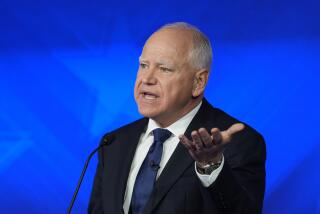Beijing’s Blindness to Rights
- Share via
If nothing else, Harry Wu is a courageous man. Accused of being a counterrevolutionary, he survived 19 years of forced labor, torture and near-starvation in Chinese prison camps. He emigrated to the United States in 1985 but surreptitiously returned to China in 1991 with a television crew to expose abuses in the camps. Now, at 58, the crusader and Milpitas resident is being held by the Chinese again.
He was arrested June 19 as he was entering his native land on his U.S. passport. Chinese officials say Wu, a naturalized American citizen, is under investigation for entering an area forbidden to foreigners, and they have rebuffed requests by American diplomats to visit him.
Wu’s arrest must be viewed in the context of rapidly deteriorating Sino-American relations amid a power struggle among Chinese officials seeking to succeed the ailing leader, Deng Xiaoping. Wu was seized two days after China recalled its ambassador to Washington to protest the Clinton Administration’s decision to allow the president of Taiwan to visit the United States. The tension between Washington and Beijing has produced economic fallout, despite the Administration’s controversial decision last year to give favored tariff status to Chinese goods even though Beijing has a sorry record of human rights violations. Chrysler now appears to have lost a bid to build a mini-van factory in south China.
Clearly, the two nations have some arduous fence-mending to do. At the very least, Beijing must allow American diplomats to visit Wu immediately. Nothing is served by detaining him.
Though Wu is a thorn in China’s side, his release would speak volumes about Beijing’s willingness to join the community of modern industrialized nations in which commercial success is compatible with basic freedoms of expression and association.
More to Read
Sign up for Essential California
The most important California stories and recommendations in your inbox every morning.
You may occasionally receive promotional content from the Los Angeles Times.










